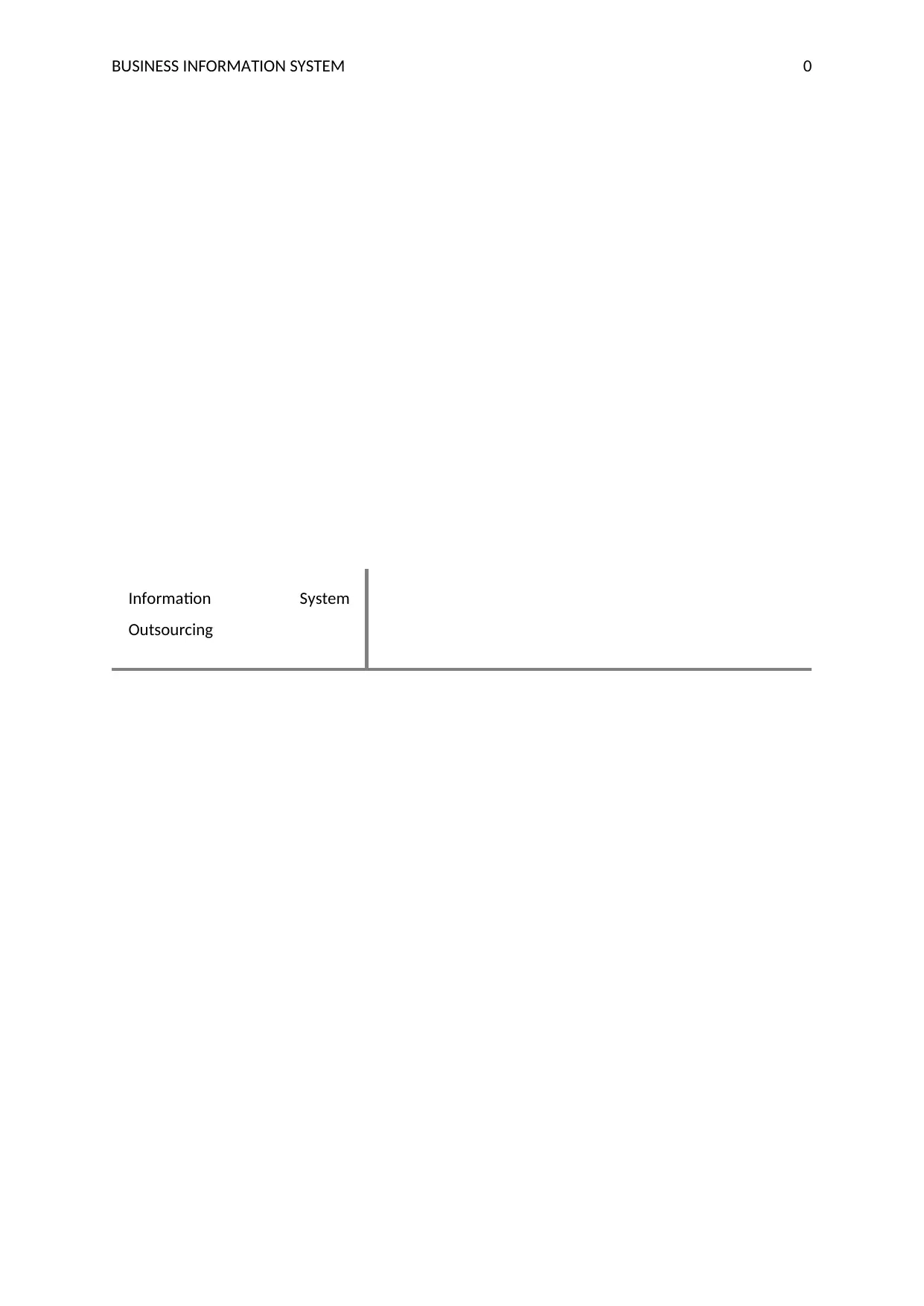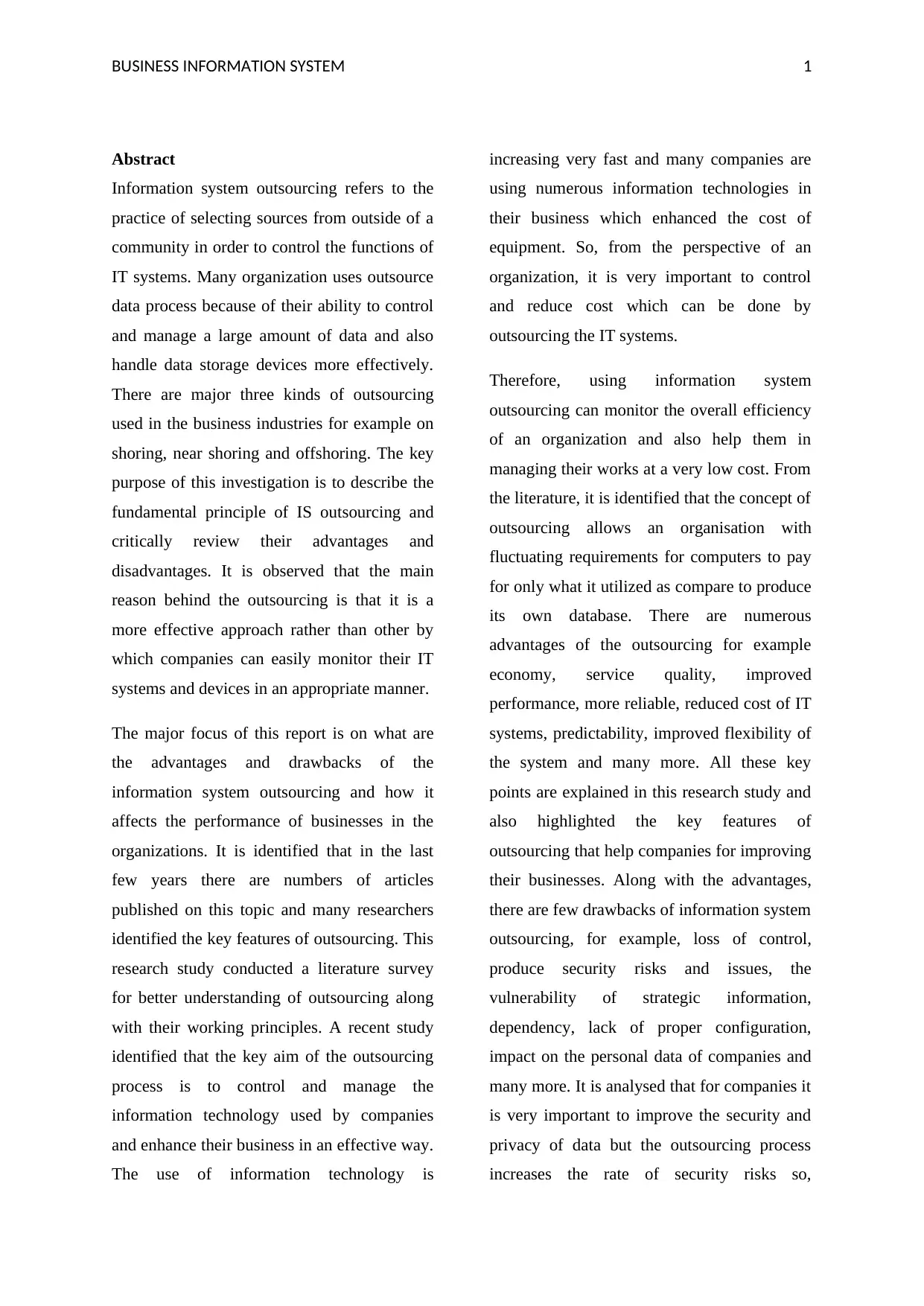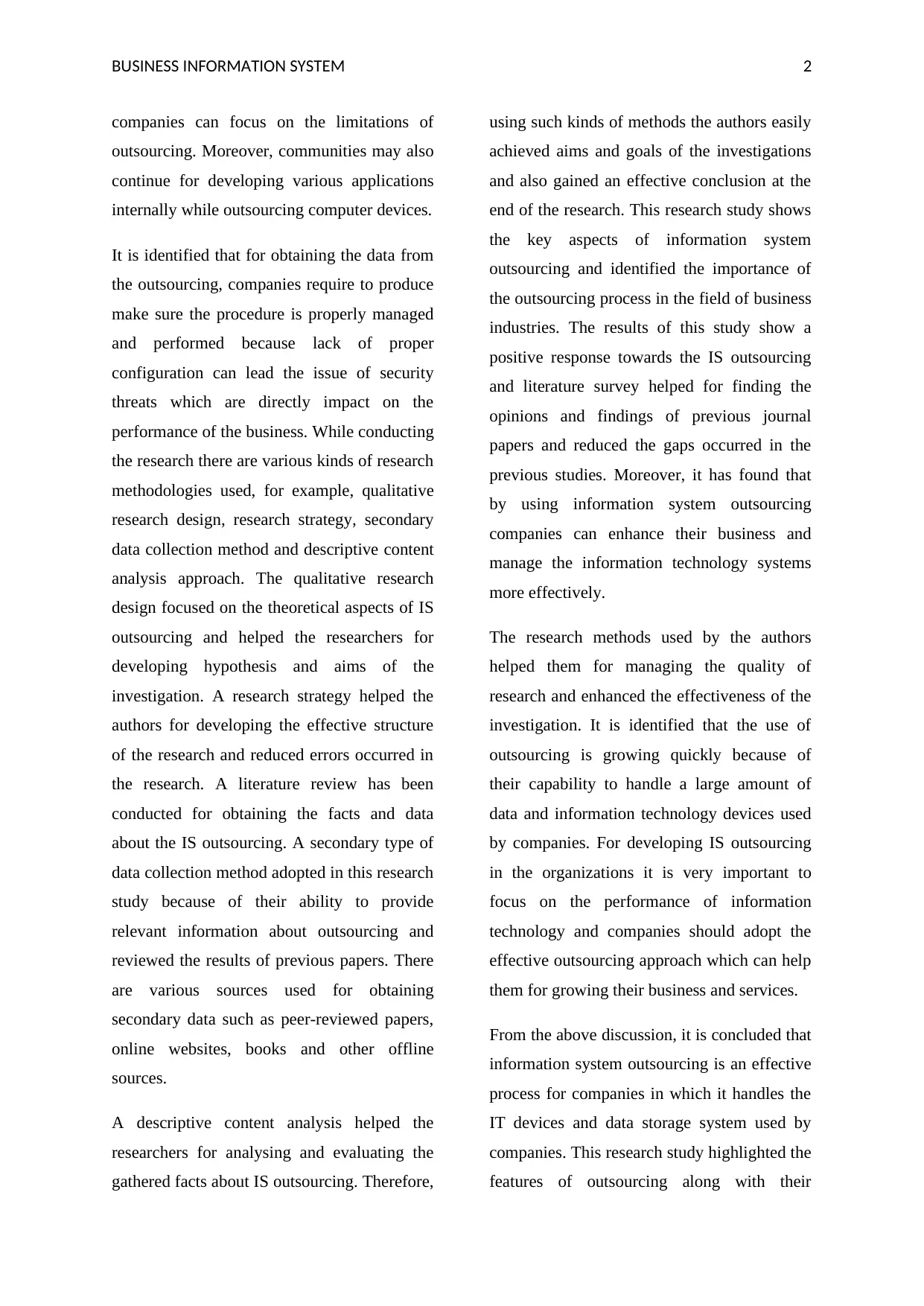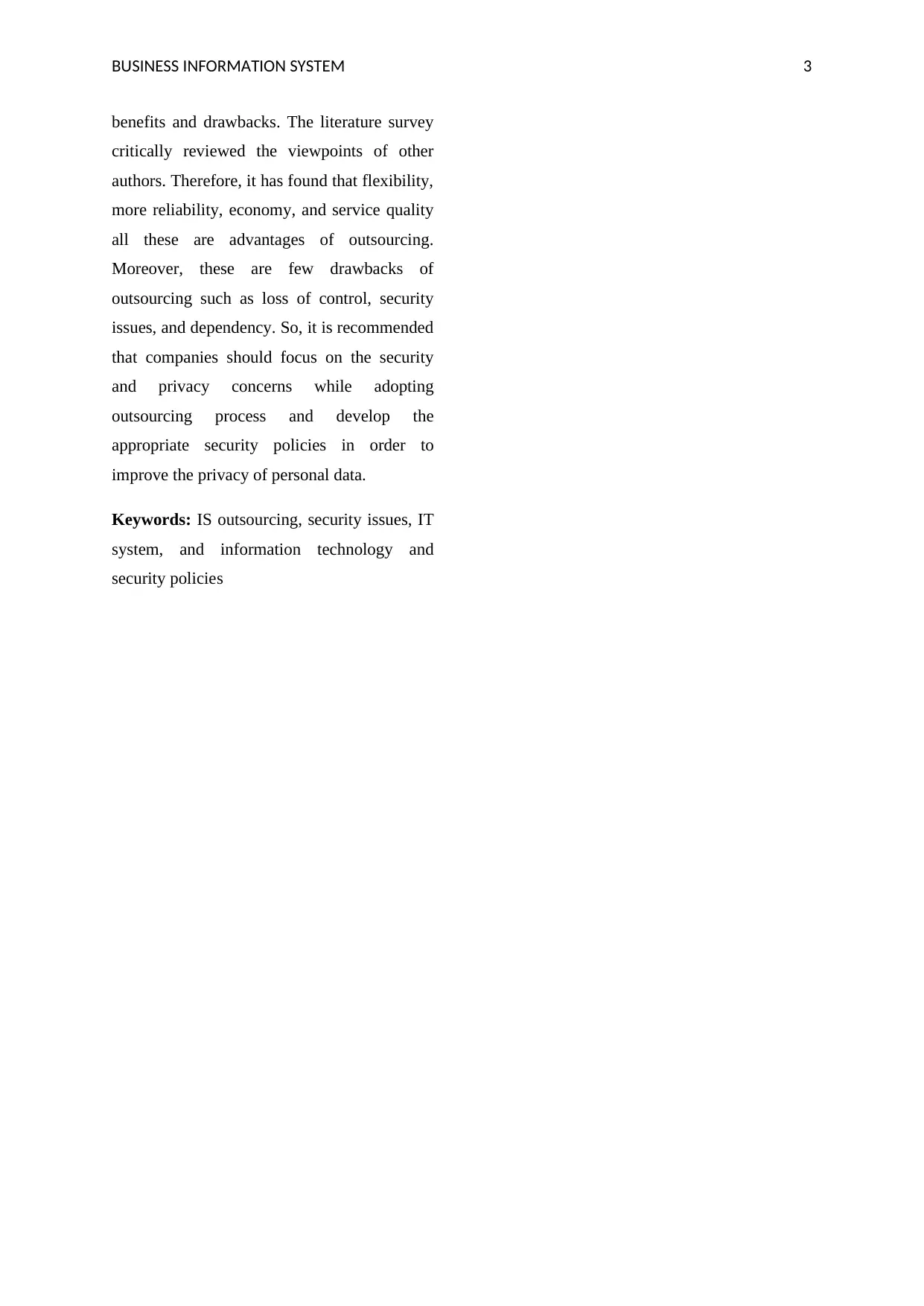Information System Outsourcing: Benefits, Challenges & Strategies
VerifiedAdded on 2023/04/04
|4
|1048
|64
Literature Review
AI Summary
This literature review delves into the realm of Information System (IS) outsourcing, examining its fundamental principles, advantages, and disadvantages. It highlights the increasing reliance of companies on information technologies and the strategic importance of outsourcing IT systems to manage costs and enhance business efficiency. The review identifies key benefits such as economy, improved service quality, enhanced performance, and reduced IT costs, while also addressing potential drawbacks like loss of control, security vulnerabilities, and dependency issues. Research methodologies employed include qualitative research design, secondary data collection, and descriptive content analysis, ensuring a comprehensive understanding of IS outsourcing and its impact on organizational performance. The study concludes that while IS outsourcing offers significant advantages, companies must prioritize security and privacy concerns by implementing robust security policies to protect personal data and mitigate potential risks. Desklib provides this document for informational purposes, offering students access to a wealth of study resources.

BUSINESS INFORMATION SYSTEM 0
Information System
Outsourcing
Information System
Outsourcing
Paraphrase This Document
Need a fresh take? Get an instant paraphrase of this document with our AI Paraphraser

BUSINESS INFORMATION SYSTEM 1
Abstract
Information system outsourcing refers to the
practice of selecting sources from outside of a
community in order to control the functions of
IT systems. Many organization uses outsource
data process because of their ability to control
and manage a large amount of data and also
handle data storage devices more effectively.
There are major three kinds of outsourcing
used in the business industries for example on
shoring, near shoring and offshoring. The key
purpose of this investigation is to describe the
fundamental principle of IS outsourcing and
critically review their advantages and
disadvantages. It is observed that the main
reason behind the outsourcing is that it is a
more effective approach rather than other by
which companies can easily monitor their IT
systems and devices in an appropriate manner.
The major focus of this report is on what are
the advantages and drawbacks of the
information system outsourcing and how it
affects the performance of businesses in the
organizations. It is identified that in the last
few years there are numbers of articles
published on this topic and many researchers
identified the key features of outsourcing. This
research study conducted a literature survey
for better understanding of outsourcing along
with their working principles. A recent study
identified that the key aim of the outsourcing
process is to control and manage the
information technology used by companies
and enhance their business in an effective way.
The use of information technology is
increasing very fast and many companies are
using numerous information technologies in
their business which enhanced the cost of
equipment. So, from the perspective of an
organization, it is very important to control
and reduce cost which can be done by
outsourcing the IT systems.
Therefore, using information system
outsourcing can monitor the overall efficiency
of an organization and also help them in
managing their works at a very low cost. From
the literature, it is identified that the concept of
outsourcing allows an organisation with
fluctuating requirements for computers to pay
for only what it utilized as compare to produce
its own database. There are numerous
advantages of the outsourcing for example
economy, service quality, improved
performance, more reliable, reduced cost of IT
systems, predictability, improved flexibility of
the system and many more. All these key
points are explained in this research study and
also highlighted the key features of
outsourcing that help companies for improving
their businesses. Along with the advantages,
there are few drawbacks of information system
outsourcing, for example, loss of control,
produce security risks and issues, the
vulnerability of strategic information,
dependency, lack of proper configuration,
impact on the personal data of companies and
many more. It is analysed that for companies it
is very important to improve the security and
privacy of data but the outsourcing process
increases the rate of security risks so,
Abstract
Information system outsourcing refers to the
practice of selecting sources from outside of a
community in order to control the functions of
IT systems. Many organization uses outsource
data process because of their ability to control
and manage a large amount of data and also
handle data storage devices more effectively.
There are major three kinds of outsourcing
used in the business industries for example on
shoring, near shoring and offshoring. The key
purpose of this investigation is to describe the
fundamental principle of IS outsourcing and
critically review their advantages and
disadvantages. It is observed that the main
reason behind the outsourcing is that it is a
more effective approach rather than other by
which companies can easily monitor their IT
systems and devices in an appropriate manner.
The major focus of this report is on what are
the advantages and drawbacks of the
information system outsourcing and how it
affects the performance of businesses in the
organizations. It is identified that in the last
few years there are numbers of articles
published on this topic and many researchers
identified the key features of outsourcing. This
research study conducted a literature survey
for better understanding of outsourcing along
with their working principles. A recent study
identified that the key aim of the outsourcing
process is to control and manage the
information technology used by companies
and enhance their business in an effective way.
The use of information technology is
increasing very fast and many companies are
using numerous information technologies in
their business which enhanced the cost of
equipment. So, from the perspective of an
organization, it is very important to control
and reduce cost which can be done by
outsourcing the IT systems.
Therefore, using information system
outsourcing can monitor the overall efficiency
of an organization and also help them in
managing their works at a very low cost. From
the literature, it is identified that the concept of
outsourcing allows an organisation with
fluctuating requirements for computers to pay
for only what it utilized as compare to produce
its own database. There are numerous
advantages of the outsourcing for example
economy, service quality, improved
performance, more reliable, reduced cost of IT
systems, predictability, improved flexibility of
the system and many more. All these key
points are explained in this research study and
also highlighted the key features of
outsourcing that help companies for improving
their businesses. Along with the advantages,
there are few drawbacks of information system
outsourcing, for example, loss of control,
produce security risks and issues, the
vulnerability of strategic information,
dependency, lack of proper configuration,
impact on the personal data of companies and
many more. It is analysed that for companies it
is very important to improve the security and
privacy of data but the outsourcing process
increases the rate of security risks so,

BUSINESS INFORMATION SYSTEM 2
companies can focus on the limitations of
outsourcing. Moreover, communities may also
continue for developing various applications
internally while outsourcing computer devices.
It is identified that for obtaining the data from
the outsourcing, companies require to produce
make sure the procedure is properly managed
and performed because lack of proper
configuration can lead the issue of security
threats which are directly impact on the
performance of the business. While conducting
the research there are various kinds of research
methodologies used, for example, qualitative
research design, research strategy, secondary
data collection method and descriptive content
analysis approach. The qualitative research
design focused on the theoretical aspects of IS
outsourcing and helped the researchers for
developing hypothesis and aims of the
investigation. A research strategy helped the
authors for developing the effective structure
of the research and reduced errors occurred in
the research. A literature review has been
conducted for obtaining the facts and data
about the IS outsourcing. A secondary type of
data collection method adopted in this research
study because of their ability to provide
relevant information about outsourcing and
reviewed the results of previous papers. There
are various sources used for obtaining
secondary data such as peer-reviewed papers,
online websites, books and other offline
sources.
A descriptive content analysis helped the
researchers for analysing and evaluating the
gathered facts about IS outsourcing. Therefore,
using such kinds of methods the authors easily
achieved aims and goals of the investigations
and also gained an effective conclusion at the
end of the research. This research study shows
the key aspects of information system
outsourcing and identified the importance of
the outsourcing process in the field of business
industries. The results of this study show a
positive response towards the IS outsourcing
and literature survey helped for finding the
opinions and findings of previous journal
papers and reduced the gaps occurred in the
previous studies. Moreover, it has found that
by using information system outsourcing
companies can enhance their business and
manage the information technology systems
more effectively.
The research methods used by the authors
helped them for managing the quality of
research and enhanced the effectiveness of the
investigation. It is identified that the use of
outsourcing is growing quickly because of
their capability to handle a large amount of
data and information technology devices used
by companies. For developing IS outsourcing
in the organizations it is very important to
focus on the performance of information
technology and companies should adopt the
effective outsourcing approach which can help
them for growing their business and services.
From the above discussion, it is concluded that
information system outsourcing is an effective
process for companies in which it handles the
IT devices and data storage system used by
companies. This research study highlighted the
features of outsourcing along with their
companies can focus on the limitations of
outsourcing. Moreover, communities may also
continue for developing various applications
internally while outsourcing computer devices.
It is identified that for obtaining the data from
the outsourcing, companies require to produce
make sure the procedure is properly managed
and performed because lack of proper
configuration can lead the issue of security
threats which are directly impact on the
performance of the business. While conducting
the research there are various kinds of research
methodologies used, for example, qualitative
research design, research strategy, secondary
data collection method and descriptive content
analysis approach. The qualitative research
design focused on the theoretical aspects of IS
outsourcing and helped the researchers for
developing hypothesis and aims of the
investigation. A research strategy helped the
authors for developing the effective structure
of the research and reduced errors occurred in
the research. A literature review has been
conducted for obtaining the facts and data
about the IS outsourcing. A secondary type of
data collection method adopted in this research
study because of their ability to provide
relevant information about outsourcing and
reviewed the results of previous papers. There
are various sources used for obtaining
secondary data such as peer-reviewed papers,
online websites, books and other offline
sources.
A descriptive content analysis helped the
researchers for analysing and evaluating the
gathered facts about IS outsourcing. Therefore,
using such kinds of methods the authors easily
achieved aims and goals of the investigations
and also gained an effective conclusion at the
end of the research. This research study shows
the key aspects of information system
outsourcing and identified the importance of
the outsourcing process in the field of business
industries. The results of this study show a
positive response towards the IS outsourcing
and literature survey helped for finding the
opinions and findings of previous journal
papers and reduced the gaps occurred in the
previous studies. Moreover, it has found that
by using information system outsourcing
companies can enhance their business and
manage the information technology systems
more effectively.
The research methods used by the authors
helped them for managing the quality of
research and enhanced the effectiveness of the
investigation. It is identified that the use of
outsourcing is growing quickly because of
their capability to handle a large amount of
data and information technology devices used
by companies. For developing IS outsourcing
in the organizations it is very important to
focus on the performance of information
technology and companies should adopt the
effective outsourcing approach which can help
them for growing their business and services.
From the above discussion, it is concluded that
information system outsourcing is an effective
process for companies in which it handles the
IT devices and data storage system used by
companies. This research study highlighted the
features of outsourcing along with their
⊘ This is a preview!⊘
Do you want full access?
Subscribe today to unlock all pages.

Trusted by 1+ million students worldwide

BUSINESS INFORMATION SYSTEM 3
benefits and drawbacks. The literature survey
critically reviewed the viewpoints of other
authors. Therefore, it has found that flexibility,
more reliability, economy, and service quality
all these are advantages of outsourcing.
Moreover, these are few drawbacks of
outsourcing such as loss of control, security
issues, and dependency. So, it is recommended
that companies should focus on the security
and privacy concerns while adopting
outsourcing process and develop the
appropriate security policies in order to
improve the privacy of personal data.
Keywords: IS outsourcing, security issues, IT
system, and information technology and
security policies
benefits and drawbacks. The literature survey
critically reviewed the viewpoints of other
authors. Therefore, it has found that flexibility,
more reliability, economy, and service quality
all these are advantages of outsourcing.
Moreover, these are few drawbacks of
outsourcing such as loss of control, security
issues, and dependency. So, it is recommended
that companies should focus on the security
and privacy concerns while adopting
outsourcing process and develop the
appropriate security policies in order to
improve the privacy of personal data.
Keywords: IS outsourcing, security issues, IT
system, and information technology and
security policies
1 out of 4
Related Documents
Your All-in-One AI-Powered Toolkit for Academic Success.
+13062052269
info@desklib.com
Available 24*7 on WhatsApp / Email
![[object Object]](/_next/static/media/star-bottom.7253800d.svg)
Unlock your academic potential
Copyright © 2020–2026 A2Z Services. All Rights Reserved. Developed and managed by ZUCOL.




